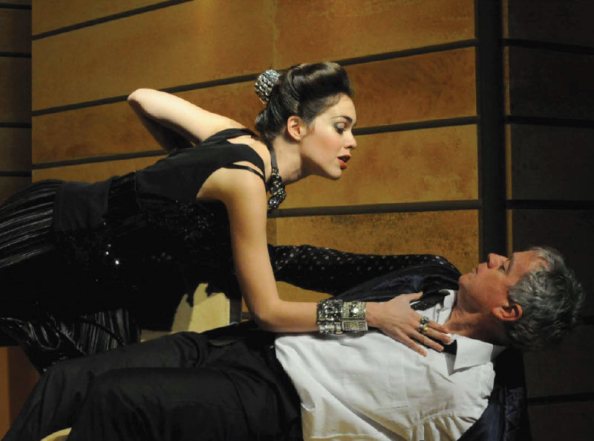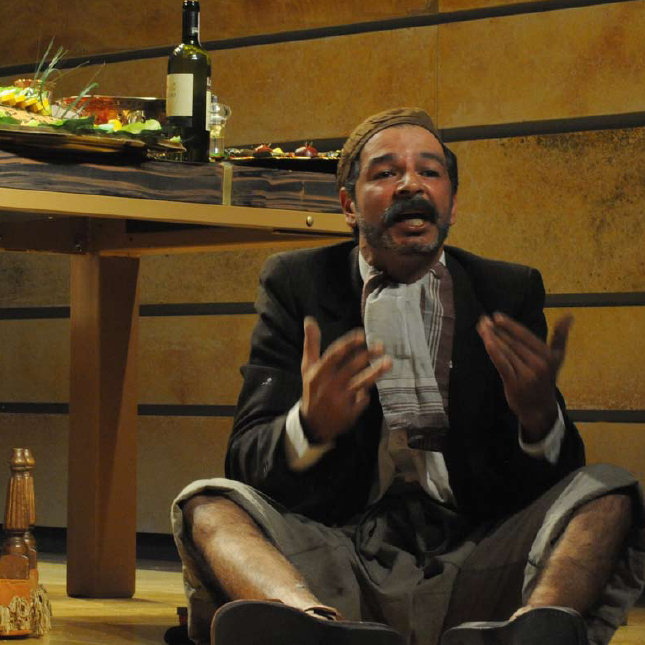
The room emanates retro-elegance, with clean lines and an Art Deco feel to the fixtures, dominated by the broad sweep of a dining table at the center. The woman seated at the table is resplendent in black silk pleated lounge pants and a sequined top. She consumes the food in front of her with almost compulsive pleasure, ignoring the man slumped at the other end of the table. He sits in a silk robe, head down, back turned to his companion and the audience. A waiter enters, dressed in spotless white, bringing yet more dishes to the table. The woman masticates, the man remains immobile, and the waiter tells the audience, conversationally, “It happened after these things that Naboth the Jezreelite had a vineyard…” quoting Kings I, 21, the Biblical chapter that is the frame story for Yaakov Shabtai’s play Eating, directed at the Khan Theatre by Michael Gurevich.
As in the best tragedies the story is well known. We know that Ahab will murder Naboth and inherit his vineyard. Eating explores the way in which such crimes can take place under the guise of government and law. While Jezebel is the uncontested villain of the biblical story, the magnitude and public nature of the act necessitates a well-orchestrated system in which all those present fulfill their roles: by their words and actions, or by their silence and inaction, complicit.
Gurevich exposes the dissonance between appearances and actions in a play that is tightly constructed, witty and replete with tension. The gleaming set and Jezebel’s (Nili Rogel) glittering presence are a counterpoint to her obsessive eating, open mouthed chewing, talking around a glob of food in her mouth, licking her lips –anything but elegant. The conversation between Ahab (Yehoyachin Friedlander) and Jezebel is familiar, they could almost be any contemporary affluent couple. The husband seized by an overpowering desire to obtain something he cannot have, the wife tired of his moaning, goading him to either do something about it or forget about it and eat his dinner before it gets cold. This familiar couple bears an uncanny resemblance to a certain Scottish couple, even in the strong sexual bond between the two.
Rogel is a commanding presence onstage, the embodiment of absolute power that refuses to acknowledge any obstacle, who defines moral considerations as a euphemism for weakness. Not even a tad squeamish, with no scruples to speak of, smiling as she deftly manipulates the men, her strength and allure easily demonstrate how it’s done. Ahab is literally a mess – tie askew, a vacant look in his eyes that reflects an almost demonic possession when he speaks of the vineyard. The triviality of his desire (he wants to turn the vineyard into a vegetable garden) serves to underscore the overwhelming force of desire itself. For Jezebel, the vineyard is irrelevant; the important issue is the audacity to refuse the King – that is the ultimate threat.
The rules are simple and Shabtai’s poetic and pointed text makes them clear: “if you don’t take from others, others will take from you…hakerem hu haketer (the vineyard is the crown).”
Appearances and maintaining appearances are crucial to this system, protocol must be followed and formalities are foremost. Ahab pulls himself together sartorially to greet his advisors, once he straightens his tie and puts on a jacket, he is literally another man, self-confident, self-possessed, the perfect host. This dissonance is cleverly portrayed in Ariel Wolf’s double role as the waiter/narrator in white, who always emerges from a door on one side of the stage with a mincing step and ingratiating smile, and his second role as the security guard with a menacing impassive look in black leather jacket and shades, who is always on the other side – two sides of the same system. The king’s advisors look eerily familiar in their white button-down shirts and dark jackets, walking onto the stage as if they had just come from a session at the Knesset, or in a legal office somewhere in the city.
The waiter brings out more and more platters of elaborately colorful food to the already over-flowing table and the guests eat lustily. The physical and symbolic presence of the food is wonderfully effective. The distance between essential needs and avarice, the ironic cultural imperative of the relationship between host and guest, the emphasis on presentation, and the lack of any limits – all are deliciously exploited. A few well-placed references to the here and now of Israel in the form of visual gags, elicit the laughter of recognition, followed by the chill of recognition. The entire cast is excellent, with Yossi Eini bringing warmth and a profound dignity to Naboth.

The dialogue draws us on in this dance of words, fast-paced and suspenseful, as a parade of food comes to the table from an array of appetizers to the final course – just desserts. As in the best (the worst) tragedies, including the ones we witness daily, the story, the events are well known, and we are left to wonder: How could anyone possibly let things like this happen?
Upcoming performance: July 3, 2018. The play will be accompanied by English supertitles and after the play the audience is invited to stay in the magical Khan courtyard for a summer cocktail. Special offer: ticket for 100 NIS includes show + drink with code 2027. the event is held in cooperation with the Times of Israel. The Khan Theater, 2 David Remez Street, Jerusalem. Tickets may be ordered online, or call: 02-6303600.
Eating by Yaakov Shabtai, directed by Michael Gurevich
Set & costume design: Frida Klaphotz-Avrahami
Lighting design: Roni Cohen
Actors: Ariel Wolf – waiter, security guard; Nili Rogel – Jezebel, Ahab’s wife; Yehoyachin Friedlander – Ahab, King of Israel; Arie Tcherner – Eliakim, King’s Advisor; Liron Baraness – Shimei – Legal Advisor; Yossi Eini – Naboth the Jezreelite.






Comments are closed.